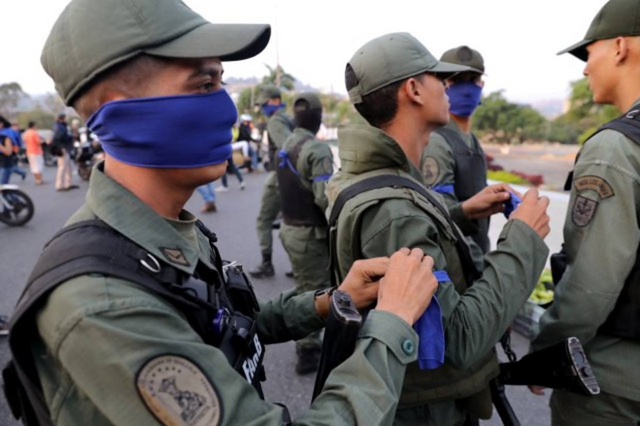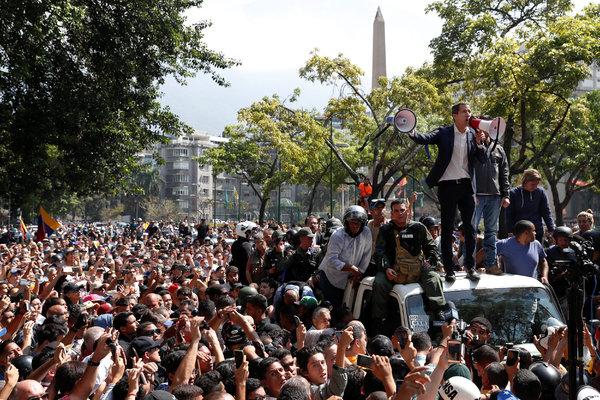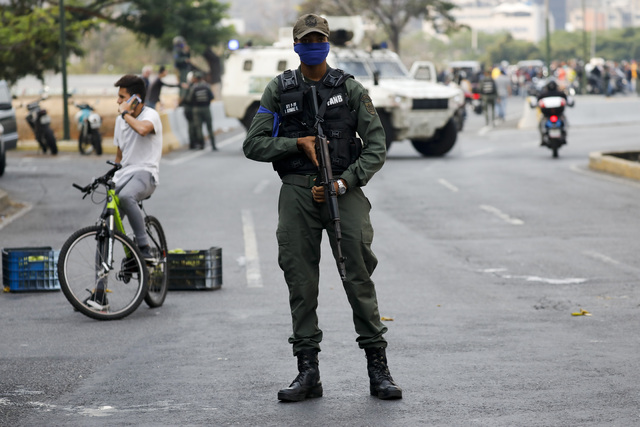Venezuela, whats going on?
Who’s involved?
Juan Guaido
Juan Guaido is the head of the Venezuelan National Assembly (AN) and Acting *President of Venezuela. He’s a member of the Voluntad Popular (Popular Will) party.
Nicolas Maduro
Nicolas Maduro is the *President of Venezuela and took over from Hugo Chavez after his death in March 2013. He was re-elected in the 2018 Venezuelan National election in which the opposition boycotted. Maduro is a member of the PSUV (United Socialists Party)
*Presidency of Venezuela is contested and 54 countries recognise Guaido as President of Venezuela
What’s happening?
January
Nicolas Maduro was sworn in as President of Venezuela for his second term on the 10th January 2019. Just minutes after Maduro was sworn in the OAS (Organization of American States) declared Maduros presidency illegitimate and called for new elections.
On the 23rd January 2019 Juan Guaido, while at an open rally in the streets of Caracas took the Presidential oath and declared himself acting president under the Venezuelan constitution. Almost immediately after he took the presidential oath, the United States recognised Juan Guaido as the legitimate president of Venezuela. The nationwide protests supporting Guaido were subdued by the GNB (Venezuelan National Guard) and it’s estimated that 13 protestors were killed.
Nicolas Maduro responded to these events by declaring that the United States was backing a coup in Venezuela and he subsequently cut all diplomatic ties.
February
February was the month that Humanitarian aid from a coalition of western countries was scheduled to arrive in Venezuela at the request of acting President Juan Guaido. Aid from the U.S first landed in Bogotá, Colombia on the 6th February. The aid was transported to the humanitarian aid staging centre at the Tienditas bridge on the 7th February. Over the course of the month, more humanitarian aid onboard USAF C-17 cargo planes was delivered to Cúcuta airport in Colombia.
On the 12th February Juan Guaido issued an ultimatum, stating that if Maduro didn’t accept the Humanitarian aid then it would enter on the 23rd of February through areas along the Colombian and Brazilian border and by sea from the Dutch Antilles.
British Billionaire Richard Branson announced that on the 22nd February a ‘Venezuela Aid Live’ concert would be held in Cúcuta, Colombia on the Venezuelan border to raise funds for humanitarian aid and raise awareness of the Venezuela crisis.
Maduros government held a rival concert nicknamed “Hands off Venezuela” in Táchira, on the Colombian border on the same date.
The attempted delivery of Humanitarian aid
After Juan Guaidos ultimatum was ignored by Nicolas Maduro. It was arranged that Humanitarian aid would enter through designated points on the 23rd February. The border with Colombia and Brazil were shut in advance by Nicolas Maduro to deter any humanitarian aid deliveries. The deliveries were attempted on Saturday afternoon. Juan Guaido was present in Cúcuta to see off the first aid trucks from Colombia. None of the aid trucks managed to reach Venezuela from Colombia or Brazil. A shipment of aid originating from Puerto Rico onboard a RoRo boat was intercepted by the Venezuelan Navy and forced to return to port. Dozens were killed in violence across Venezuela and hundreds of Venezuelan soldiers crossed the Venezuelan border into Colombia and Brazil to declare their support for Juan Guaido. (The full events of the 23rd February will be covered at a later date in a full in depth article)
Guaidos South American Tour
Afer sneaking across the Venezuelan border into Colombia on the 22nd February and orchestrating the failed Humanitarian delivery on the 23rd, Juan Guaido travelled to Bogotá, Colombia to meet with U.S Vice President Mike Pence and then meet with the Lima group on the 25th February. After his visit to Bogotá, Juan Guaido visited the presidents of Brazil, Paraguay, Argentina and Ecuador to rally support for his Presidency and discuss how to rebuild the future of Venezuela.
Guaidos return to Venezuela
Guaido had been forced to sneak across the Venezuela border into Colombia due to a travel ban placed on him by Nicolas Maduro government. Many people thought he would be arrested immediately upon arrival in Venezuela after flying in from Panama but to many peoples surprise he was welcomed back into Venezuela by border agents at Caracas’ Maiquetia airport.
Juan Guaido arriving back at Maiquetia airport on the 4th March
March
March was the month where Venezuela experienced the worst electricity blackouts in the countries history. The blackouts started on the 7th March. The causes behind the power blackout were debated with Maduro claiming cyber warfare by the United States against Venezuelas electricity grid. The truth is a bit simpler, a vegetation fire underneath the power lines near a Major substation caused a momentary loss of power at the Guri dam power station in Bolivar State. The generators at Guri dam were forced to shut down consequently taking offline power stations in Caruachi and Macagua. The power outage was experienced in 90% of Venezuela and lasted for at least a week in some areas.
April
Humanitarian Aid from the Red Cross (Cruz Roja) being offloaded at Caracas Maiquetia airport on 16th April
April marked the beginning of International Humanitarian aid being accepted into Venezuela by Nicolas Maduro, with the Red Cross announcing that the first aid shipment would give aid to around 650,000 people, this arrived into Venezuela during April and was distributed to citizens.
30th April Uprising
The 30th April uprising is one of the most significant events from the current Venezuela crisis.
In the early hours of the 30th April, Juan Guaido gathered with a group of soldiers from the GNB and SEBIN outside the La Carlota airbase in Caracas. Guaido was joined by prominent opposition leader Leopoldo Lopez who had been freed from house arrest by rogue SEBIN officials. The day escalated into clashes between soldiers and protestors supporting Guaido and the security forces loyal to Maduro.
Juan Guaido and Leopoldo Lopez standing outside La Carlota airbase on the morning of the 30th April
Despite the relatively large support from Soldiers and protestors, the day ended in failure for Guaido with his uprising unable to bring down the ‘Usurper’ (Maduro) and many of the soldiers supporting Guaido forces to go into hiding, with at least 25 soldiers requesting asylum in the Brazilian embassy in Caracas.
May
May started with the after effects of the 30th April uprising and Guaidos planned protests for the 1st May took place as expected.
It didn’t take long for Maduro to take action over the attempted uprising and the TSJ (Supreme Court of Venezuela) stripped 7 members of the National Assembly of their parliamentary immunity.
On the 8th May the Vice President of the National Assembly Edgar Zambrano was arrested by SEBIN on charges of “Betraying the Homeland” and “instigating an insurrection” during the attempted uprising.
Juan Guaidos ambassador to the United States Carlos Vecchio has met with the Commander of U.S Southcom and defense and State Department officials on the 19th May
What comes next?
No one really knows what the future holds for Venezuela but the current situation cannot continue for much longer. U.S sanctions are starting to squeeze Maduros allies and a growing fuel crisis is crippling Venezuela, Maduros focus on Caracas has left many remote areas of Venezuela lawless. With more sanctions looming over Venezuela (the next batch of sanctions will reportedly target CLAP) Maduro has been forced to send his allies to negotiate with the Venezuelan opposition in Norway. The possibility of new elections will be a welcome sign for some but the opposition will be cautious given the allegations of election rigging by Maduro in the 2018 elections.








